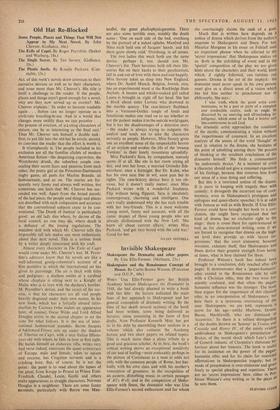Old Hat Re-Blocked
Some People, Places a,nd Things That Will Not Appear in My Next Novel. By John Cheever. (Gollancz, 16s.) ALL of this week's novels draw attention to their narrative devices as well as to their characters, and none more than Mr. Cheever's. His title is itself a challenge to the reader If the people, places and things aren't good enough for a novel, why are they now served up as stories? Mr. Cheever explains: 'In order to become readable again . . . fiction can no longer operate as a sixth-rate boarding-house. And in a world that changes more swiftly than we can perceive . . . the process of eviction, of se•cting characters of stature, can be as interesting as the final cast.' Thus Mr. Cheever sets himself a double task : first, to put life into the old-hat he evicts; second, to convince the reader that the effort is worth it.
It triumphantly is. The people included in his exclusion are all the familiar cliches of modern American fiction—the despairing copywriter, the Westchester drunk, the suburban couple con- cealing their secret fears and passions from each other, the pretty girl at the Princeton-Dartmouth rugby game, all parts for Marlon Brando, all homosexuals, and so on. The stories are fre- quently very funny and always well written, but sometimes one feels that Mr. Cheever has suc- ceeded too well. Apart from the broad parody of the last piece, the people and things and places are described with such corhpassion and accuracy that the conventional subjects cease to be con- ventional. 'The Death of Justina' is particularly good: an old lady dies where, by decree of the local council, no one may die, where death is a defiance of the zoning regulations. The macabre skill with which Mr. Cheever tells this impossibly tall tale makes one most enthusiastic about that next novel. This is a serious book by a writer deeply concerned with his craft.
Almost every character in The Exile of Capri would come under Mr. Cheever's ban. M. Peyre- fitte's admirers know that his novels are like a well-informed gossip-columnist's account of a film premiere to which the international set has given its patronage. The air is thick with titles and pedigrees: a duchess smiles at a cardinal whose chaplain is sitting next to a Knight of Malta who is in love with the duchess's brother. M. Peyrefitte's device, and the secret of his suc- cess, is that his characters are all real people heavily disguised under their own names. In his new book, which has a lyrically absurd intro- duction by Cocteau (who makes an appearance later, of course), Oscar Wilde and Lord Alfred Douglas arrive in the second chapter to set the tone for what follows. It is the era of inter- national homosexual scandals, Baron Jacques d'Adelsvvard-Fersen sets up under the shadow of Tiberius on Capri, with a nice Italian fifteen- year-old with whom he falls in love at first sight. He builds himself an elaborate villa, writes very bad verse indeed, entertains the queer aristocracy of Europe, male and female, takes to opium and cocaine, has Cingalese servants and is a crashing bore. But, of course, he is not the point: the point is to read about the lapses of the great, from Krupp to Proust to Prince Eitel- Friedrich. Claudel, Lenin, Gorki and others make appearances as straight characters. Norman Douglas is a neighbour. There are some funny moments, particularly with Baron von Man-
teuffel, the great phallophysiognomist. There are also some terrible ones, notably the death scene : 'One on each side of the bed, overhung by the portrait of a naked ephebe, Manfred and Nino each held one of Jacques' hands, and felt them grow slowly cold.' Overhung, in all senses.
The two ladies this week both use the same device : perhaps it, too, should join Mr. Cheever's list. Their heroines both tell their life- stories flat on their backs to their psychiatrists, fall in and out of love with them and end happily. Miss Savory takes us deep into New England, where Dr. Andre Munch, Belgian, Jewish, nice, has an experimental ward it the Rockledge State Asylum. A beaten and whisky-soaked girl called Laura is brought in, right off her head. She has a block about sister Lavinia who drowned in the marble quarry. The case-history flashback into a Vermont-Gothic tangle of feuds and fanaticism makes one read on to see whether or not the patient makes it to the outside world again, but it has the disadvantages of a detective story —the reader is always trying to outguess the analyst and tends not to take the characters seriously as people. However, Miss Savory gives one an excellent sense of the unspeakable horror of an asylum and evokes the life of the 'swamp Yankees' in their lonely mountains splendidly.
Miss Packard's Sara, by comparison, scarcely seems ill at all. She sits in her room crying all day, and sees her lover, a married Grimsby fish- merchant, once a fortnight. But Dr. Kahn, who has his own neat line in wit, soon puts her to rights. The case-history device here is too ob- vious, but it doesn't really matter, since Miss Packard writes with a wonderful freshness, Flip without being flippant, Sara is absolutely contemporary, charming and intelligent. One can't really understand why she has such trouble with her boy-friends. This is a most welcome young novel, funny and accurate, with all the comic despair of those young people who are already disillusioned with the New Left. 'She knew all about current affairs,' writes Miss Packard, 'and got very bored with the cold war.' Good for her.
JULIAN MITCHELL






























 Previous page
Previous page